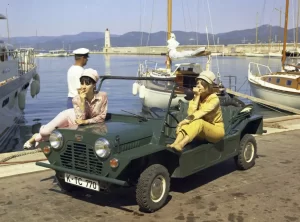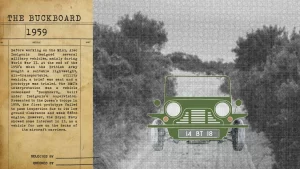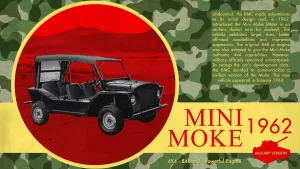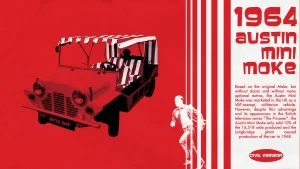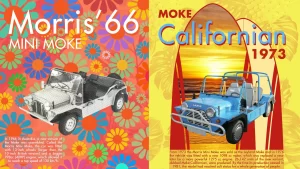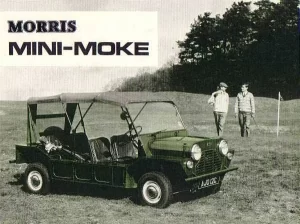
Moke America offers two vehicle models, The Gas Moke, powered by a four cylinder engine and the Electric Moke green-friendly electric power, available exclusively in the USA by Moke America. The Moke is a vehicle based on the Mini designed for the British Motor Corporation that began as a military invention for the British army in the late 1950s. The name “Moke” is an archaic dialect term for donkey. The Moke has been marketed under various names including Austin Mini Moke, Morris Mini Moke and Leyland Moke.
| Categories |
| eMOKE – ELECTRIC BEACH RUNABOUT |
| Websites |
| mokeamerica.com mokeinternational.com |
Moke America, LLC
2100 NE 2nd Ave
Miami, FL 33137.
1-866-294-1325
Moke UK
Unit 3, Stable Courtyard
Wingrave Road
Aston Abbotts
Buckinghamshire
HP22 4LU
United Kingdom
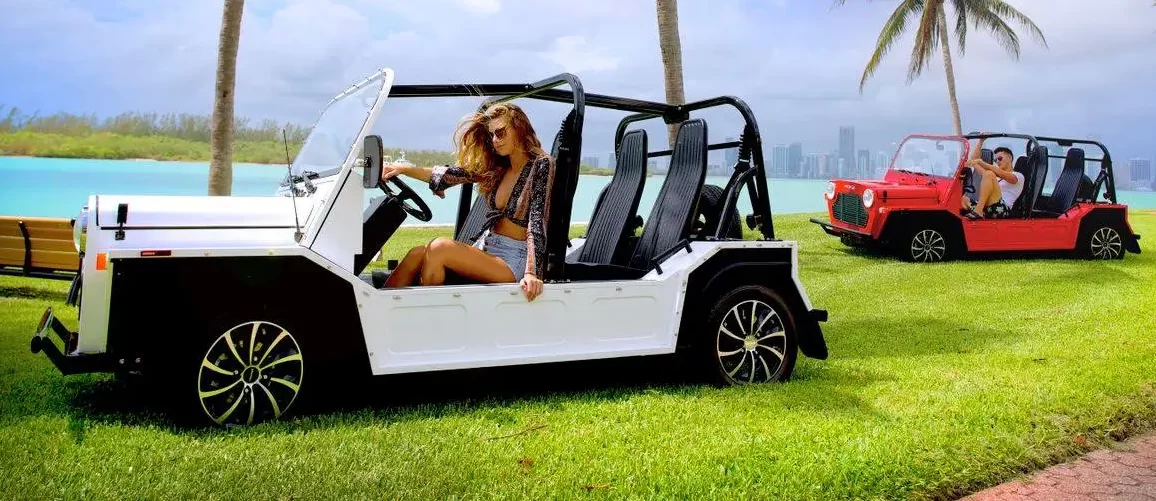
MORE ON MOKE
In 2012 Moke International teamed up with designer Michael Young, Chery Automotive and Sicar Engineering to release a new version of the Moke, styled MOKE. The new MOKE has kept its old look but features modern-day comforts and improved components. The New MOKE featured in the Thai Motor Expo in December 2014 and was expected to be released in Thailand, Australia, the Caribbean, the Seychelles and Mauritius, Egypt, Greece, and New Zealand in early to mid-2015.
In 2016, Moke America, LLC introduced the first all electric Moke vehicle (eMoke) in the United States. The eMoke is an all electric Low Speed Vehicle (LSV) which is manufactured in America by Cruise Car Inc. using sealed, maintenance free batteries. With a top speed of 25 mph and a new contemporary look, the eMoke looks to modernize the classic version first envisioned by the British in the 1960’s. All parts and accessories for the eMoke are available from Mini Mania Inc., Moke America, LLC and their authorized dealers throughout the United States.
Nosmoke, an electric version of the eMoke is being produced in France in the ex-Heuliez manufacture. The car is homologated in Europe through the heavy quadricycle category (same most of the quads).
While BMW-owned Mini has discussed other vehicles named after the Moke, no production has ever taken place. A concept car called the MINI Beachcomber, presented at the 2010 North American International Auto Show as a preview of the Countryman crossover, which draws on Moke styling. The Beachcomber has an open body concept, which according to the brand is supposed to offer an ultimate expression of freedom in a car, was never produced.
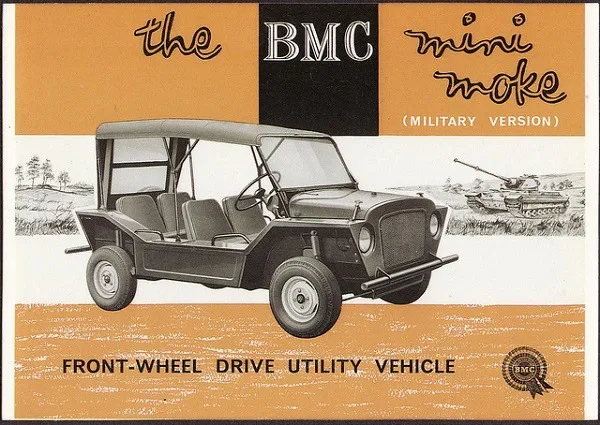
Designed in the late 1950’s by the Austin Mini father Alec Issigonis, the Mini Moke finally became an icon on the Riviera, Australia or even the Caribbean for its fun and also practical side, its robustness and the feeling of freedom that you enjoy whilst driving. Today, faithful to the brand’s origin, Moke teams have also integrated all the current technology a car like this needs to have : a 4-cylinder injection engine, power steering, manual or automatic transmission, waterproof seats, etc.
The Moke is a vehicle based on the Mini designed for the British Motor Corporation (BMC) by Sir Alec Issigonis and John Sheppard. The name comes from “Mini”—the car with which the Moke shares many parts—and “Moke”, which is an archaic dialect term for donkey. The Moke has been marketed under various names including Austin Mini Moke, Morris Mini Moke and Leyland Moke.
The initial design was a prototype for a light military vehicle in the style of the American Jeep, but its small wheels and low ground clearance made it impractical as an off-road vehicle. It was subsequently offered in a civilian version as a low-cost, easily maintained utility vehicle. The Moke finally achieved success as a beach buggy—becoming a popular “cult” vehicle in the Algarve, Seychelles, Australia, the United States and many tropical resorts in the Caribbean. The original Moke used identical engine, transmission and suspension parts from the Mini Van.
The first Mokes were only built at BMC’s Longbridge, Birmingham plant. 14,518 Mokes were produced in the UK between 1964 and 1968, 26,000 in Australia between 1966 and 1981, and 10,000 in Portugal between 1980 and 1993 when production of the Moke ended.


